99+ Best ChatGPT Prompts for Online Courses to Improve Your Course Creation
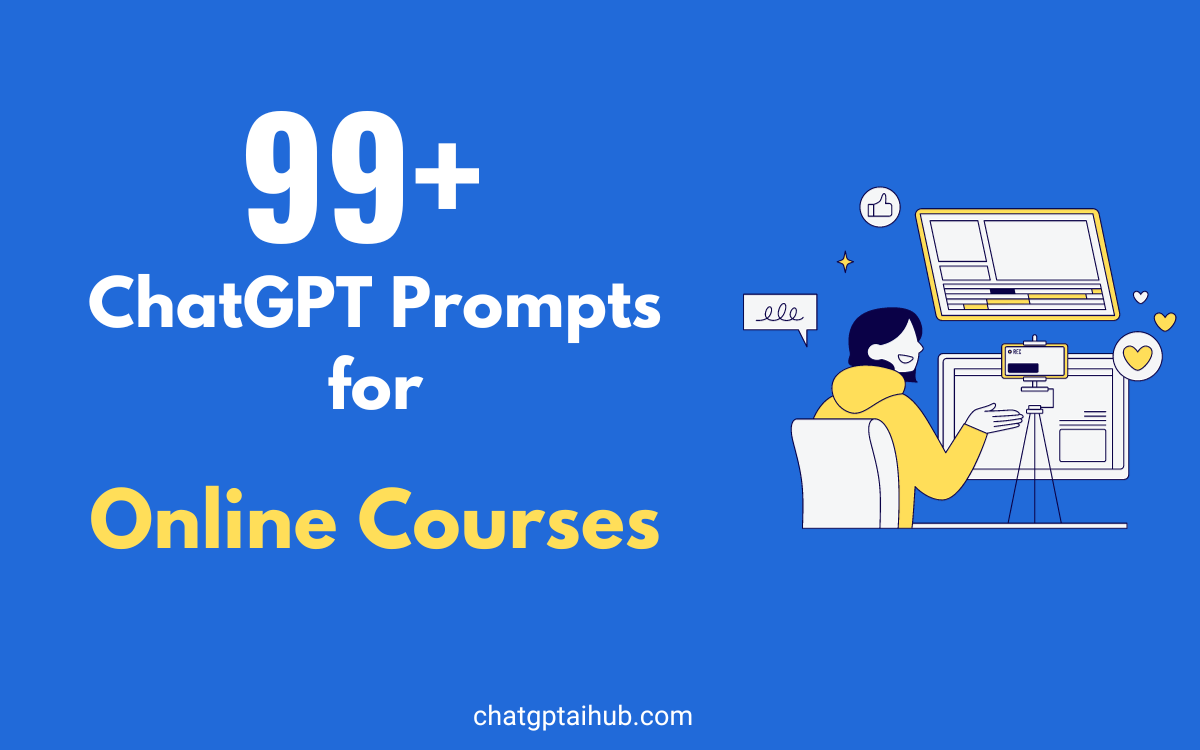
Can’t create a course that’s engaging and thought-provoking? Here you go! Introducing the ChatGPT Prompts for Online Courses Creation for your ease. These best ChatGPT Prompts are designed to spark creativity and engagement, allowing you to effortlessly generate responses that captivate your audience. With our carefully crafted list of the best ChatGPT prompts for online courses, you can take your courses to the next level and provide an interactive learning experience for your students.
Are you struggling to come up with engaging content for your online courses? Are you unsure of how to kickstart your lesson plans? ChatGPT Prompts for Online Courses is here to solve your problem! With its advanced AI capabilities, it can generate creative and effective content that will captivate your students and make your courses more engaging than ever before.
Discover the power of ChatGPT Prompts for Online Courses and watch your creation experience soar to new heights. Forget about boring lectures and unlock a world of interactive and engaging content that will revolutionize the way you share knowledge.
How ChatGPT Prompts for Online Courses Creation Saves You Time and Energy
ChatGPT Prompts for Online Courses Creation are important because they provide a time-saving solution for busy professionals. With the potential of AI understood, these professionals lack the time to optimize ChatGPT prompts. By offering pre-built prompts, I’m providing a hassle-free way for them to save time and energy, allowing them to focus on their online courses creation.
Using ChatGPT Prompts for Online Courses Creation will benefit professionals by ensuring their message is conveyed flawlessly. With crystal clear communication, they can avoid miscommunications that could impact their professional reputation. By utilizing these prompts, professionals can stand out in the crowded digital space, boosting their effectiveness and making a lasting impact in their online courses.
Optimize Effectively Your Course Creation with ChatGPT’s Super Prompts for Online Courses
Act as an expert course creator. Your task is to help me in developing a course from collecting data for it to structuring it in its final format. First of all, ask me all the necessary questions so that you have enough information on what I want to prepare for my audience. But don’t ask all the questions at once but one by one. Ask me about what my expertise is and why I am developing this course and to which audience I am targeting specifically.
Then ask me if I already have a proper idea of what my course will be about or not. In the case, I am not sure about what to prepare. Share some ideas with me. I will select an idea.
Then move towards the next step. Develop a comprehensive course outline for this course which is aimed at [Target Audience]. While generating the course outline, keep in mind that the course should start from beginner level topics and progress to advanced level topics. Also, Propose a learner engagement strategy for the course in the outline.
Then Prepare a structure of how many modules, how many chapters in each module will cover. Also in how much time it will be covered. How many weeks and how many hours per week? While Generating modules, add assessments on completion of every module, it can be in the form of an assignment, quiz, project. Set it according to the course requirements. Main focus of assessment is evaluation only.
Then, move towards the writing learning objectives for the following course outline. After that, Write a compelling course description. While you are writing a description for the course, focus on what challenges my target audience is facing and how that will be solved by my course.
After outline, structure, description writing, now we are very sure of what our course includes. We will move towards generating the content for each chapter. For the first chapter, share an outline with me. I will tell you if it is all ok or if anything needs to be added or removed. Once the outline is done. Then you will generate the content. Provide real-world examples and case studies to illustrate topics with the links to the described case studies. Be very clear about it that while generating content, do not forget the fact the content needs to be very engaging. Students must be excited about it and not get bored during the course.
The same process will be repeated for each chapter. When one module ends, add assessment for evaluation.
How to use this Master Prompt?
This Prompt covers everything for a course creation. When using this prompt, If you are not sure about what to create actually, chatgpt will ask you about your expertise and according to them, it will share ideas with you of what can be created by you. After selecting one idea, chatgpt will be asking about your audience and some other necessary information so that it is fully customized as per your requirements. It will share outline, description, structure and at the end it will start generating content for your course.
But everything will not happen at once but step by step because the course must have the length which chatgpt is not capable of generating at once. Also, you can share your feedback on every step with chatgpt so that it is according to your requirements.
4 Powerful ChatGPT Prompts for Interactive Online Courses
Course Idea Generation
Act as an expert course creator. I am an expert at [input your expertise] and I am developing this course due to [Input your motivation behind the development of course].My Target audience has [input characteristics, interests, and needs of your intended audience]. I need assistance on what type of courses I can create. Share some ideas with me. Also share potential topics which can be covered in each course you suggested.
Course Outline Strategy
Act as an expert course creator. I am an expert at [input your expertise] and I am developing this course due to [Input your motivation behind the development of course].My Target audience has [input characteristics, interests, and needs of your intended audience]. This is the [input short description] of my course. Develop a course outline that progresses from beginner to advanced level topics. Please provide an overview of the modules and chapters I can design for this course, keeping in mind the needs of my target audience.
Learner Engagement Strategy
Act as an expert course creator. Propose a learner engagement strategy that will keep my audience actively involved throughout the course. How do I plan to ensure their participation and interaction?
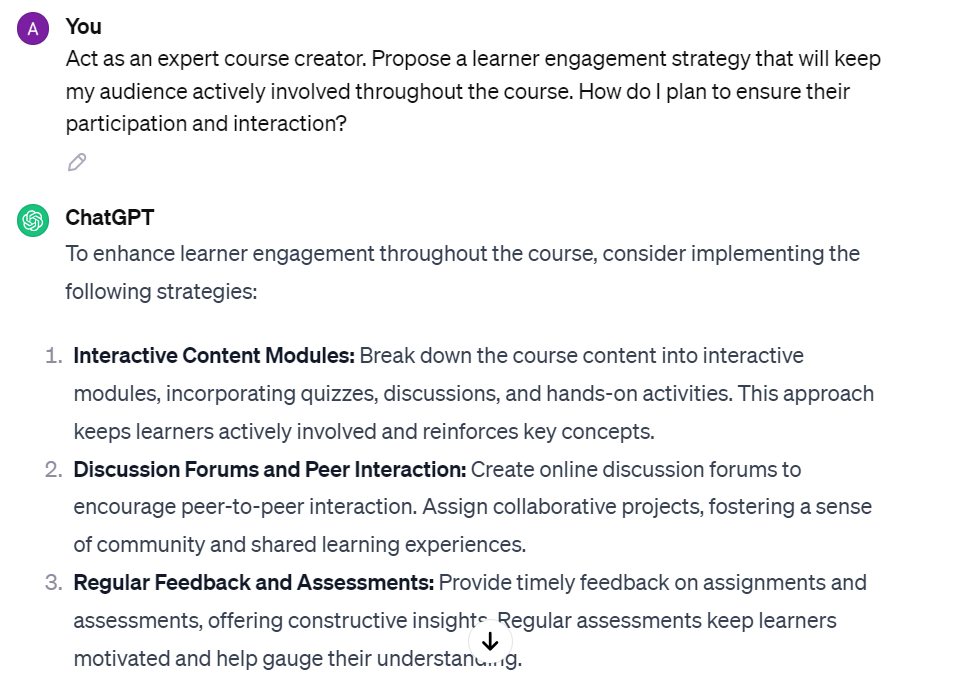
Assessment Setting Guideline
Act as an expert course creator. In order to assess the progress of my students, it’s important to include assessments at the end of each module. What type of assessments would I need to incorporate to evaluate their understanding and knowledge?
99+ Impactful ChatGPT Prompts for Developing Online Courses
- Module Development Strategies:
Explore effective strategies for deciding on course modules, ensuring a logical progression and comprehensive coverage of the subject matter.
- Optimizing Course Structure:
Learn best practices for structuring an online course to enhance user experience and facilitate effective learning.
- Strategic Use of Technology:
Explore how to strategically leverage technology to enhance the learning experience and streamline course delivery.
- Setting Learning Objectives:
Learn how to define clear and achievable learning objectives for each module, guiding course development and student expectations.
- Time Management in Course Creation:
Develop insights into time management techniques specifically tailored for planning and creating an online course, from conception to launch.
- Creating a Course Outline:
Dive into the process of creating a detailed course outline, including deciding on key topics, subtopics, and the flow of information.
- Determining Course Length:
Understand factors influencing the ideal length of an online course, balancing content depth with learner engagement.
- Strategies for Module Design:
Explore different approaches to designing course modules, ensuring clarity, coherence, and alignment with learning objectives.
- Engagement Tactics for Online Learning:
Delve into effective engagement strategies to keep students motivated and actively participating throughout the course.
- Incorporating Interactive Elements:
Explore the integration of interactive elements, such as quizzes, discussions, and assignments, to enhance learner engagement and comprehension.
- Deciding Assessment Methods:
Consider various assessment methods and strategies for evaluating student progress and understanding within an online course.
- Personalizing the Learning Experience:
Develop techniques for personalizing the learning experience to cater to diverse learner needs and preferences.
- Determining Multimedia Integration:
Explore the role of multimedia elements, such as videos, graphics, and interactive content, in enhancing course content and engagement.
- Feedback Mechanisms for Improvement:
Learn how to establish effective feedback mechanisms to continuously improve course content and address student needs.
- Accessibility and Inclusivity in Course Design:
Explore considerations for ensuring that course content is accessible and inclusive, accommodating learners with diverse needs.
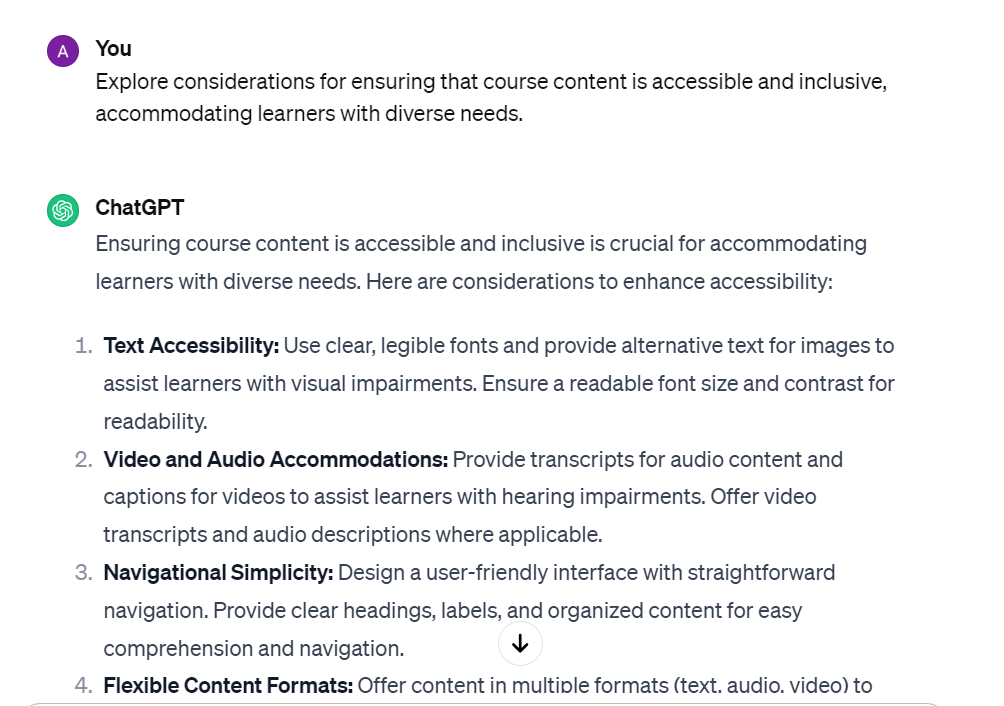
- Setting Clear Learning Pathways:
Determine how to create clear learning pathways within the course, guiding students through a structured and coherent educational journey.
- Balancing Theory and Practical Application:
Consider strategies for achieving a balanced blend of theoretical concepts and practical application in course content.
- Deciding on Evaluation Criteria:
Define criteria for evaluating the success of the course, including student performance, engagement metrics, and feedback analysis.
- Incorporating Real-world Examples:
Explore methods for incorporating real-world examples and case studies into course content to enhance practical understanding.
- Iterative Course Refinement:
Learn about the importance of ongoing evaluation and iterative refinement of the course based on student feedback and changing educational landscapes.
- Target Audience Identification:
Define effective strategies for identifying and understanding the target audience to tailor the course content and delivery to their needs.
- Creating Engaging Introductory Content:
Explore techniques for crafting compelling introductory content that captures the attention of learners and sets the tone for the course.
- Setting Clear Learning Outcomes:
Develop methods for articulating clear and measurable learning outcomes to guide both course creation and student expectations.
- Interactive Discussion Forum Strategies:
Discover approaches to fostering meaningful discussions and interactions within online forums to enhance collaborative learning.
- Building Assessments Aligned with Objectives:
Learn how to design assessments that align seamlessly with the course objectives and provide valuable insights into student understanding.
- Effective Visual Design in Course Materials:
Explore principles of effective visual design to enhance the aesthetics and usability of course materials for optimal engagement.
- Sequencing Content for Optimal Learning:
Determine strategies for sequencing course content to facilitate a logical progression of concepts and maintain learner engagement.
- Incorporating Peer Review:
Explore the benefits and best practices of incorporating peer review mechanisms for assignments to encourage collaborative learning and diverse perspectives.
- Utilizing Learning Analytics:
Understand how to leverage learning analytics tools to gather insights into student engagement, performance, and areas for improvement.
- Encouraging Self-directed Learning:
Develop strategies for encouraging self-directed learning, empowering students to take ownership of their educational journey.

- Effective Use of Multimedia for Instruction:
Explore ways to incorporate multimedia elements effectively, such as videos, podcasts, and interactive simulations, to enhance instructional content.
- Determining Optimal Course Duration:
Understand factors influencing the optimal duration of an online course and how to strike a balance between depth and learner engagement.
- Creating a Supportive Learning Community:
Learn techniques for fostering a supportive online learning community, encouraging collaboration, and addressing challenges together.
- Iterative Module Refinement:
Understand the importance of regularly reviewing and refining individual modules based on student feedback and changing educational needs.
- Crafting Engaging Learning Objectives:
Explore methods for crafting clear, specific, and engaging learning objectives that guide both instructional design and student progress.
- Implementing Gamification Elements:
Discover the benefits and strategies for incorporating gamification elements to increase motivation and engagement within the course.
- Managing Course Workload:
Explore techniques for managing and distributing course workload effectively, ensuring a balanced and manageable learning experience for students.
- Incorporating Real-world Case Studies:
Learn how to effectively integrate real-world case studies into course content to provide practical insights and application scenarios.
- Strategies for Time-flexible Learning:
Develop strategies for accommodating learners with varying schedules, allowing for flexible participation and engagement.
- Measuring and Enhancing Student Retention:
Explore methods for measuring and enhancing student retention rates, keeping learners engaged throughout the duration of the course
- Adapting to Different Learning Styles:
Explore strategies for creating a course that caters to various learning styles, ensuring inclusivity and engagement for all participants.
- Utilizing Storytelling Techniques:
Discover the power of storytelling in course creation and learn how to incorporate narrative elements to make content more relatable and memorable.
- Promoting Collaborative Projects:
Develop methods for incorporating collaborative projects within the course structure, fostering teamwork and shared learning experiences.
- Implementing Formative Assessments:
Explore the benefits of formative assessments and learn how to integrate them effectively to monitor student progress and adjust teaching strategies.
- Creating Microlearning Modules:
Understand the concept of microlearning and learn how to create short, focused modules to cater to learners with limited time availability.
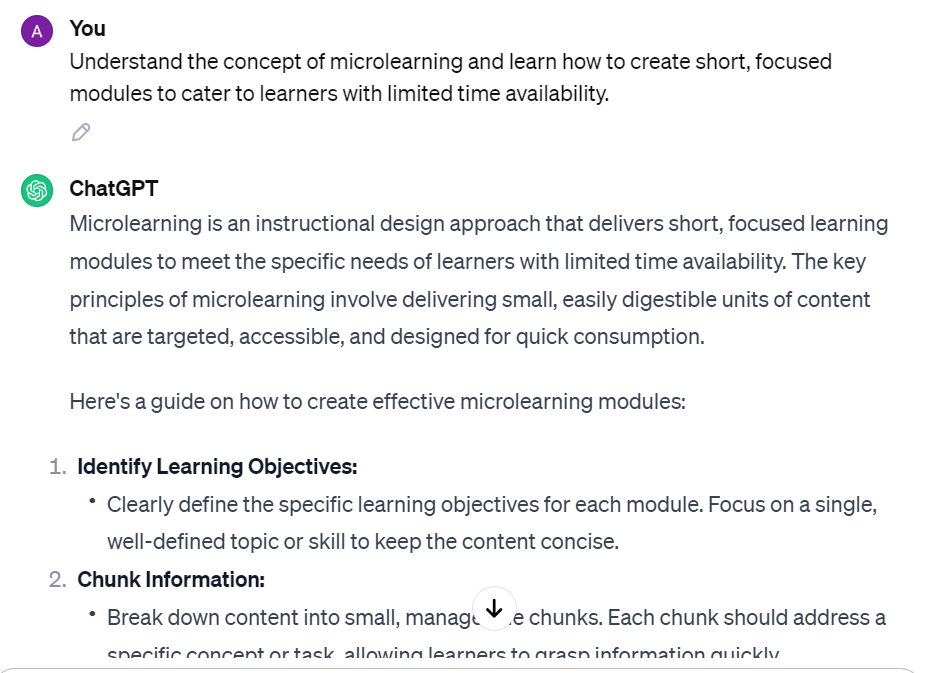
- Navigating Copyright and Fair Use:
Explore guidelines and best practices for navigating copyright and fair use issues when incorporating external resources into course materials.
- Incorporating Industry Experts:
Learn how to collaborate with industry experts or guest speakers to bring real-world insights and experiences into the course.
- Fostering a Growth Mindset:
Explore strategies for fostering a growth mindset among learners, encouraging them to embrace challenges and view mistakes as opportunities for learning.
- Implementing Mobile Learning Strategies:
Explore the integration of mobile learning strategies to accommodate learners who prefer accessing content on smartphones or tablets.
- Integrating Social Media for Learning:
Discover ways to leverage social media platforms as tools for collaboration, discussion, and resource sharing within the course community.
- Implementing Flipped Classroom Techniques:
Explore the benefits of flipped classroom techniques, where traditional teaching methods are reversed, with instructional content delivered online before class.
- Creating Effective Learning Guides:
Learn how to design comprehensive learning guides that assist students in navigating the course materials and assignments efficiently.
- Ensuring Accessibility Compliance:
Understand the importance of accessibility compliance and learn how to design courses that are accessible to learners with disabilities.
- Building a Multimodal Learning Experience:
Explore the integration of multiple modes of learning, including visual, auditory, and kinesthetic elements, for a holistic learning experience.
- Strategies for Time Management for Learners:
Provide learners with effective time management strategies to help them balance course commitments with other responsibilities.
- Implementing Peer-to-Peer Feedback:
Explore the benefits and methods of incorporating peer-to-peer feedback to enhance the learning experience and promote constructive criticism.
- Integrating Real-time Virtual Sessions:
Learn how to conduct real-time virtual sessions, such as webinars or live Q&A sessions, to provide additional support and interaction opportunities.
- Exploring Open Educational Resources:
Understand the benefits of open educational resources (OER) and learn how to integrate them into course materials for cost-effective and diverse content.
- Designing a Course Marketing Strategy:
Explore strategies for marketing and promoting your online course to attract a wider audience and maximize enrollment.
- Implementing Continuous Professional Development:
Explore methods for incorporating elements of continuous professional development within the course to ensure relevance and ongoing learning for participants.
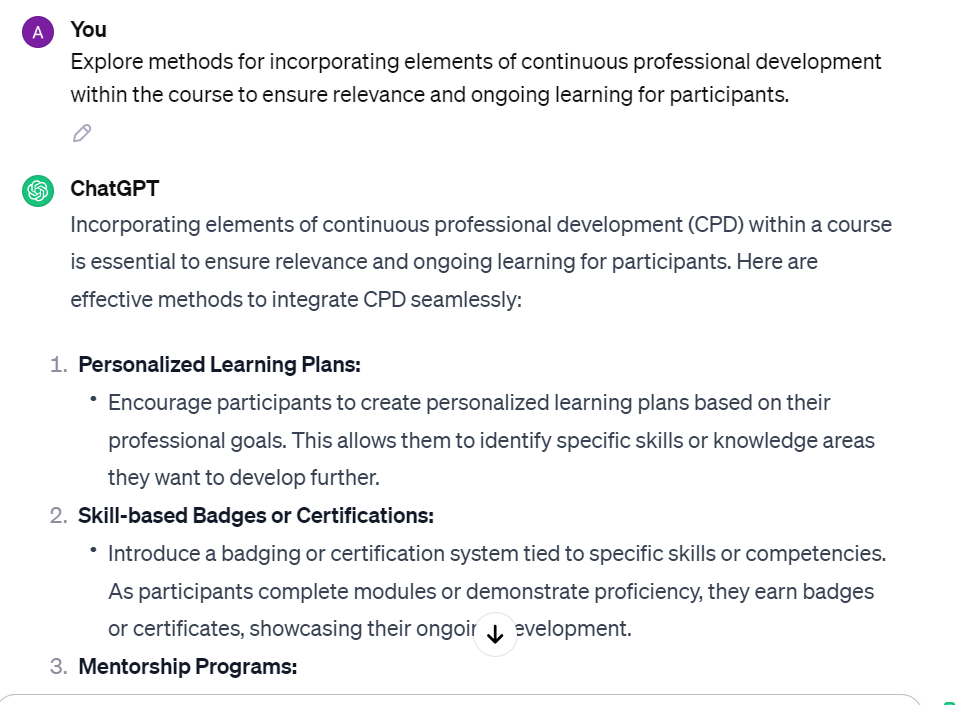
- Conducting Learner Needs Assessment:
Develop techniques for conducting a thorough needs assessment to identify and address specific learning requirements within the target audience.
- Implementing Adaptive Learning Technologies:
Explore the integration of adaptive learning technologies that personalize the learning experience based on individual student progress and preferences.
- Encouraging Reflective Practice:
Develop strategies for incorporating reflective practice within the course, promoting self-awareness and deepening the learning experience.
- Setting Clear Expectations for Participation:
Define clear expectations for student participation, including guidelines for engagement in discussions, group projects, and other collaborative activities.
- Analyzing Learning Analytics for Continuous Improvement:
Learn how to analyze learning analytics data to gain insights into student behavior, preferences, and overall course effectiveness for continuous improvement.
- Ensuring Cross-platform Compatibility:
Explore methods to ensure cross-platform compatibility of course materials, allowing seamless access on various devices and operating systems.
- Designing Effective Learning Resources:
Learn how to create diverse and effective learning resources, such as tutorials, guides, and multimedia content, to support different learning styles.
- Incorporating Cultural Sensitivity:
Understand the importance of cultural sensitivity in course design and explore strategies to create an inclusive and respectful learning environment.
- Implementing a Peer Mentorship Program:
Explore the benefits of implementing a peer mentorship program within the course, fostering support and guidance among participants.
- Integrating Career Development Components:
Learn how to integrate components that focus on career development, such as resume building, interview skills, and networking, to enhance practical outcomes.
- Measuring and Enhancing Student Motivation:
Explore strategies for measuring and enhancing student motivation throughout the course, fostering a positive and engaged learning community.
- Facilitating Virtual Networking Opportunities:
Create virtual networking opportunities within the course to help participants connect, share experiences, and expand their professional networks.
- Ensuring Inclusive Assessment Methods:
Explore assessment methods that are inclusive and accommodate diverse learning styles, ensuring fair evaluation for all participants.
- Navigating Ethical Considerations in Course Content:
Understand ethical considerations in course content creation, including proper attribution, avoiding plagiarism, and addressing sensitive topics responsibly.
- Designing Interactive Simulations:
Learn how to design and incorporate interactive simulations to provide hands-on learning experiences and reinforce theoretical concepts.
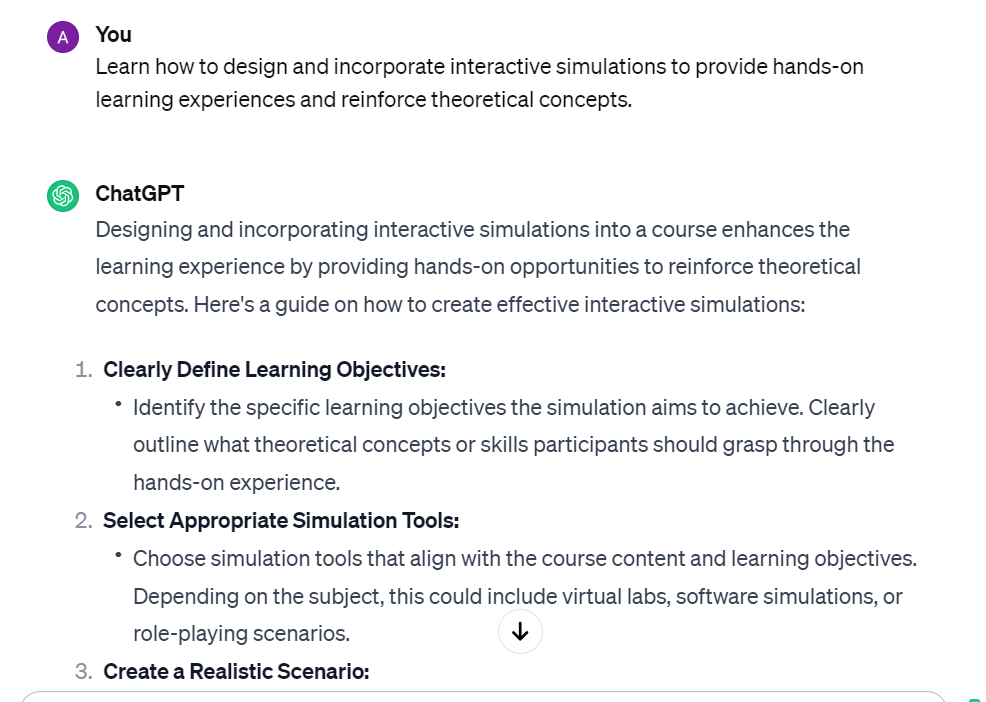
- Implementing Just-in-Time Learning Modules:
Explore the concept of just-in-time learning modules, delivering content when learners need it most, enhancing relevance and retention.
- Fostering a Community of Practice:
Develop strategies for fostering a community of practice within the course, encouraging ongoing collaboration and knowledge sharing.
- Addressing Learning Styles in Assessment:
Explore how to consider different learning styles when designing assessments, ensuring fair evaluation for visual, auditory, and kinesthetic learners.
- Utilizing User Feedback for Continuous Improvement:
Learn how to gather and utilize user feedback, both during and after the course, to make continuous improvements for future iterations.
- Integrating Wellness and Mental Health Resources:
Explore strategies for integrating wellness and mental health resources within the course to support the overall well-being of participants.
- Effective Time Management Strategies for Professionals
Design an online course that teaches professionals how to manage their time efficiently, enhancing productivity and work-life balance.
- Digital Marketing Fundamentals
Create a comprehensive course covering the basics of digital marketing, including SEO, social media strategies, and content creation.
- Mastering Remote Collaboration Skills
Develop a course focused on equipping individuals and teams with the skills needed for effective collaboration in virtual work environments.
- Building Emotional Intelligence
Craft an online program to help individuals understand, develop, and strengthen their emotional intelligence for personal and professional growth.
- Financial Literacy Essentials
Build a course covering essential financial literacy topics, including budgeting, investing, and managing personal finances for a secure financial future.
- Coding Bootcamp for Beginners
Design a comprehensive coding bootcamp for beginners, covering popular programming languages such as Python and JavaScript.
- Sustainable Living Practices
Create an online course that explores sustainable living practices, emphasizing eco-friendly habits and conscious consumerism.
- Effective Public Speaking and Presentation Skills
Develop a course aimed at enhancing public speaking and presentation skills for professionals seeking to communicate with confidence.
- Graphic Design Essentials with Adobe Creative Suite
Craft a course that teaches the essentials of graphic design using popular tools like Adobe Creative Suite, focusing on practical skills and creativity.
- Introduction to Artificial Intelligence and Machine Learning
Build an online course introducing non-technical audiences to the basics of artificial intelligence and machine learning.
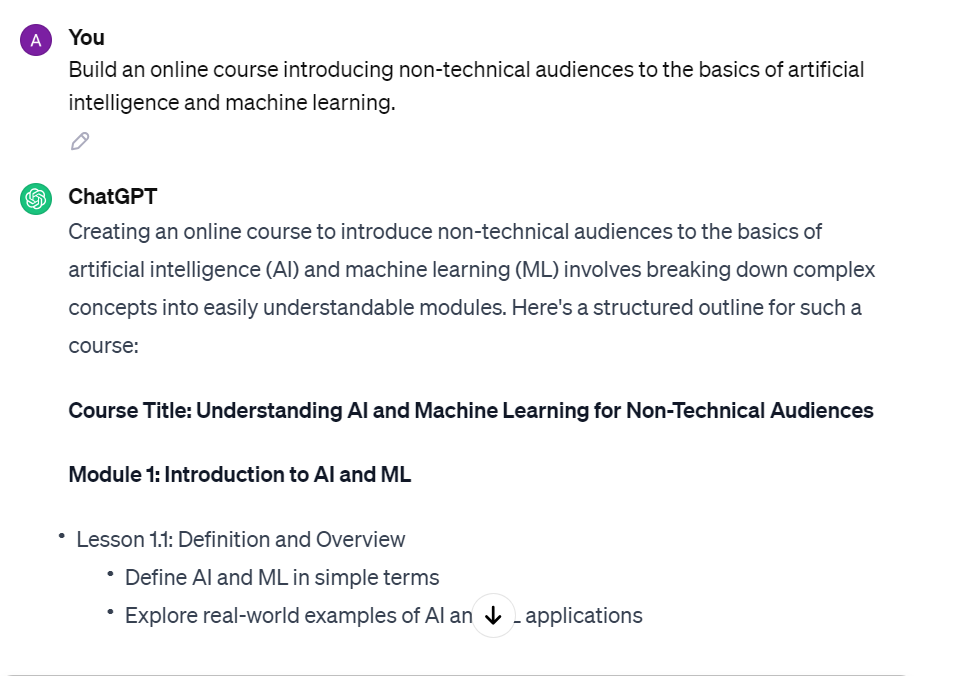
- Holistic Fitness and Wellness Program
Design a comprehensive fitness and wellness program integrating exercise routines, nutrition advice, and mindfulness practices.
- Effective Workplace Communication
Create a course on effective communication in the workplace, covering email etiquette, virtual communication skills, and fostering positive interactions.
- Entrepreneurship Essentials
Develop a course covering entrepreneurship essentials, including ideation, business planning, and execution for aspiring entrepreneurs.
- Photography Fundamentals for Beginners
Craft an online photography course for beginners, covering basic techniques and principles of composition to improve photography skills.
- Cybersecurity Awareness and Protection
Build a course that educates individuals on cybersecurity awareness, online threats, and protective measures to enhance digital security.
- Data Analysis Using Excel, Python, or R
Design a course on data analysis using popular tools like Excel, Python, or R, providing practical skills for effective data interpretation.
- Personal Development Journey
Create an online course focusing on personal development, covering goal setting, resilience, and self-discovery for a fulfilling life.
- UX/UI Design Principles
Craft a course on UX/UI design principles, focusing on creating user-friendly digital experiences for web and mobile applications.
- Project Management Methodologies and Tools
Develop a course on effective project management methodologies and tools for successful project planning and execution.
- Mindfulness and Stress Management Techniques
Build an online course on mindfulness and stress management techniques to promote a healthier and more balanced lifestyle.
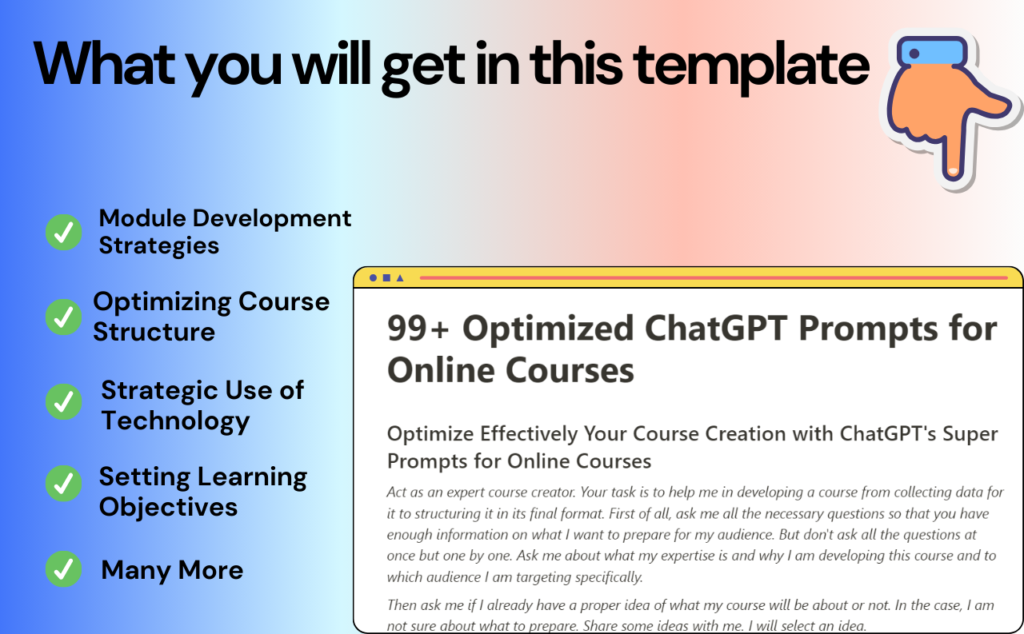
Get 99+ ChatGPT Prompts for Online Courses – Complete List Here!
Free Prompts forever – Complete Online Courses Prompts List

Final Thoughts:
By offering pre-built ChatGPT prompts for online courses creation, I am providing a solution that saves busy professionals time, energy, and the hassle of crafting optimized prompts. These prompts make the course creation journey smoother, elevate content effortlessly, and enhance readability. Embrace the benefits of ChatGPT prompts and watch your writing and evaluations soar. Start experimenting with different prompts and see your skills flourish. Happy Course Creation!

